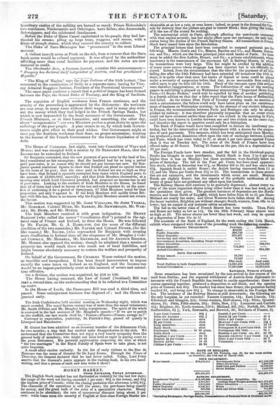The House of Commons, last night, went into Committee of
Ways and Means; and was occupied with a motion by Sir BENJAMIN Ham, that the Income-tax be extended to Ireland.
Sir Benjamin contended, that the new payment of poor-rates by the land of Ire- land constituted no fair exemption: that the landlord had for so long a period paid poor-rates, is no reason why he should not pay income-tax now. Sir Ben- jamin quoted statistical figures to show that Ireland can plead no special burden on the score of its poor; that the rates paid in Ireland are not so high as they have been; that Ireland is specially exempted from taxes which England pays, to the amount of 12,000,0001. annually; and that Irish Members themselves, at a meeting over which Lord Cloncurry presided, had proposed an income-tax in aid of poor-rates. Looking to the conduct of Irish Members in the House, he found that 52 of them had voted in favour of the tax and only 8 against it; on the ques- tion of continuing it for a period of three years, 67 Irish Members voted for that proposition and only 9 against it. If the Irish Members will saddle Great Bri- tain with this tax, there is no reason why the English Members should not return the favour.
This motion was supported by Mr. Joust Witaaaiss, Sir JOBE TYRELL, Mr. Hcatrimeri, Colonel MORE, Mr. BANICE8, Mr. NEWDEOA, TE Mr. WAS- LEY, Mr. HUME, and Mr.
The Irish Members received it with great indignation. Sir HENRY Batumi( (who called the mover " Conciliation Hall") pointed to the agi- tated state of France and Ireland, to deter the House. He was followed by Mr. FAGiN, Mr. G. A. Hamar:row, (on the score of the different condition of the two countries) Mr. NAPIER and Colonel DUNNE, (for the like reason,) Mr. R0011E, (who reproached Sir Benjamin with creating more disaffection in Ireland than all the eloquence of Mr. Meagher,) Colo- nel CONOLLY, Mr. MONSELL, Mr. REYNOLDS, and Sir ARTI11311 BRODER. Mr. Mocom also opposed the motion; though he admitted that a species of property-tax would reach those who sneak out of local liabilities, and might become absolutely necessary to restore the welfare and prosperity of Ireland.
On behalf of the Government, Sir CHARLES WOOD resisted the motion, as impolitic and inexpedient. It has been found inconvenient to impose exactly the same taxes on Ireland as on England, and the Income-tax would be an impost particularly cruel at this moment of severe and calami- tous affliction.
On a division, the motion was negatived, by 218 to 138. The House having resumed, the Law of Entail (Scotland) Bill was read a second time, on the understanding that it be referred to a Committee up-stairs. In the House of Lords, the Passengers Bill was read a third time, and passed. Some unimportant business was disposed of ; and the House ad- journed early.


























 Previous page
Previous page